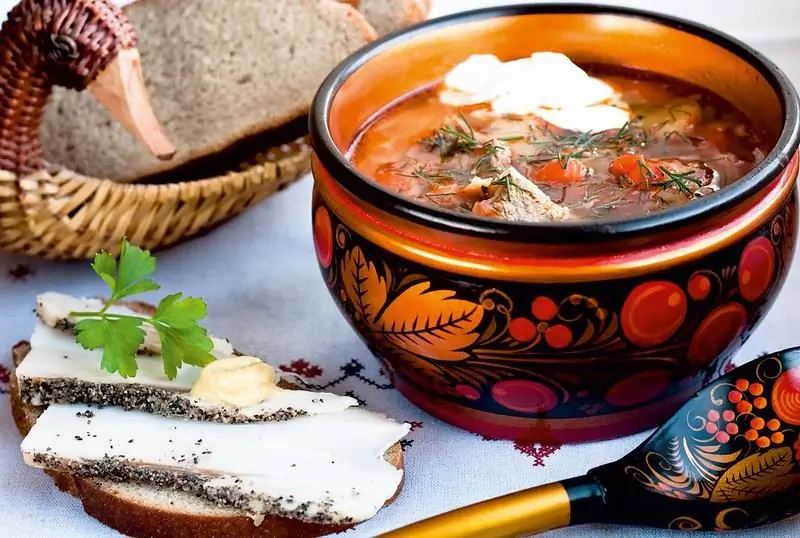
Table of contents:
- Author Bailey Albertson albertson@usefultipsdiy.com.
- Public 2023-12-17 12:53.
- Last modified 2025-01-23 12:41.
From felt boots to jellied meat: 7 foreign things and dishes that many mistakenly consider native Russian

Many familiar items that are considered primordially Russian are rooted in the traditions of other peoples of the world. They were borrowed for a very long time, and we do not even know who we owe for recipes of our favorite dishes or national relics.
Jelly

Many peoples had a tradition of cooking rich broths from meat and animal bones.
It is convenient to take this food with you on the move. If necessary, the frozen broth could be reheated in a kettle to keep warm in inclement weather.
They came up with a similar dish - galantine. Minced meat was made from boiled meat, vegetables and eggs were added, then sent to the cold.
Hat with ear flaps

When foreigners come to Russia, they tend to buy a traditional souvenir - a hat with earflaps. Periodically, this headdress comes into fashion among modern youth.
Malachai was sewn in the shape of a cone. The lapels of the cap in windy and cold weather could protect the faces of the soldiers. Malachai is very warm, because it was sewn from sheep's skin.
And then for many years it took root in the Soviet Union as a headdress in a set of military and police uniforms.
The shape of the church domes

Dome churches are considered the hallmark of Russia. In fact, this architectural idea is rooted in Byzantine traditions.
Constantinople extended its cultural influence to Russia in the 10th century. Russian craftsmen, having adopted the external hipped roof forms, began to build their temples from wood.
And the onion dome of the church came to us much later from Bavaria. This dome was also made in the Muslim Middle East and India.
Felt boots

Felt boots are invariably associated with Russian frosts. However, the first hints of this type of shoe were found during excavations in Pompeii.
In Russia, felt boots were adopted from the Asian peoples during the invasion of the Golden Horde. The Mongols had a similar shoe called pima.
Borscht

No other dish causes as much controversy about its origin as borscht. In the chronicles of Kievan Rus, borscht has been mentioned since the XIV century.
Already in ancient Rome, cabbage was idolized and many dishes were prepared from it, considering it very useful for health.
Arguing about the championship is probably not worth it. After all, borscht, having won a reliable position in the cuisines of many nations, at the same time acquired national taste traits.
Gzhel

The tradition of painting dishes with blue paints on a white background originated in China. Ceramic products with this design were in great demand in Iraq, and then gradually conquered Europe.
At the very beginning of the 19th century, the Gzhel Porcelain Factory was built. Its founder Pavel Kulikov established the production of white dishes, and master painters developed their own school of painting with cobalt.
Dumplings

The history of the appearance of dumplings in Russia begins with the Mongol invasion. And the Mongols borrowed this dish from the Chinese.
The principle of making dumplings is purely oriental: long preparatory work and a short process of heat treatment of the product.
The dumplings were very easy to store, so they fell in love with Siberians. The Chinese traditionally perceive yui-pao as a festive dish on New Year's Eve, while the Russians consider it everyday.
Recommended:
Stars Who Disgraced Themselves With The Phonogram - The Names Of Russian And Foreign Performers

Russian and foreign stars who disgraced themselves, speaking to the soundtrack. Photo and video
What Things Provoke A Cat To Do Bad Things

What provokes a cat to do bad things and how to prevent it
Things That Will Surprise A Foreigner In A Russian's House

What things really surprise a foreigner in the house of a Russian man in the street
What Facts Exist About Borscht, Which Many Consider To Be A Common Dish

What interesting facts show that borscht is not such a simple dish
Five Expensive Things Many People Regret Buying

What five expensive things are rarely used in the household, and many regret buying them
